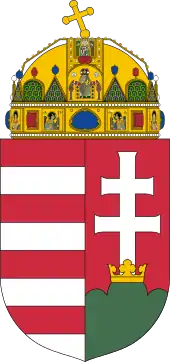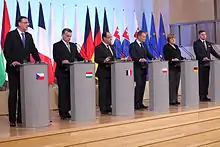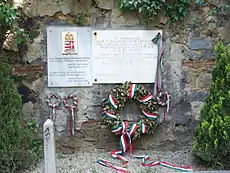Foreign relations of Hungary
Hungary wields considerable influence in Central and Eastern Europe and is a middle power in international affairs.[1][2] The foreign policy of Hungary is based on four basic commitments: to Atlantic co-operation, to European integration, to international development and to international law. The Hungarian economy is fairly open and relies strongly on international trade.
 |
|---|
| This article is part of a series on the politics and government of Hungary |
|
|
Hungary has been a member of the United Nations since December 1955 and member of European Union, the NATO, the OECD, the Visegrád Group, the WTO, the World Bank, the AIIB and the IMF. Hungary took on the presidency of the Council of the European Union for half a year in 2011 and the next will be in 2024. In 2015, Hungary was the fifth largest OECD Non-DAC donor of development aid in the world, which represents 0.13% of its Gross National Income, in this regard Hungary stands before Spain, Israel or Russia.
Hungary's capital city, Budapest is home to more than 100 embassies and representative bodies as an international political actor.[3] Hungary hosts the main and regional headquarters of many international organizations as well, including European Institute of Innovation and Technology, European Police College, United Nations High Commissioner for Refugees, Food and Agriculture Organization of the United Nations, International Centre for Democratic Transition, Institute of International Education, International Labour Organization, International Organization for Migration, International Red Cross, Regional Environmental Center for Central and Eastern Europe, Danube Commission and even others.[4]
Since 1989, Hungary's top foreign policy goal was achieving integration into Western economic and security organizations. Hungary joined the Partnership for Peace program in 1994 and has actively supported the IFOR and SFOR missions in Bosnia. Hungary since 1989 has also improved its often frosty neighborly relations by signing basic treaties with Ukraine, Slovakia, and Romania. These renounce all outstanding territorial claims and lay the foundation for constructive relations. However, the issue of ethnic Hungarian minority rights in Romania, Slovakia and Ukraine periodically causes bilateral tensions to flare up. Hungary since 1989 has signed all of the OSCE documents, and served as the OSCE's Chairman-in-Office in 1997. Hungary's record of implementing CSCE Helsinki Final Act provisions, including those on the reunification of divided families, remains among the best in Central and Eastern Europe.
Except for the short-lived neutrality declared by the anti-Soviet leader Imre Nagy in November 1956, Hungary's foreign policy generally followed the Soviet lead from 1947 to 1989. During the Communist period, Hungary maintained treaties of friendship, cooperation, and mutual assistance with the Soviet Union, Poland, Czechoslovakia, the German Democratic Republic, Romania, and Bulgaria. It was one of the founding members of the Soviet-led Warsaw Pact and Comecon, and it was the first central European country to withdraw from those organizations, now defunct. After 1989, Hungary oriented more towards the West, joined NATO in 1999 and the European Union in 2004.


Overview
As with any country, Hungarian security attitudes are shaped largely by history and geography. For Hungary, this is a history of more than 400 years of domination by great powers—the Ottomans, the Habsburg dynasty, the Germans during World War II, and the Soviets during the Cold War—and a geography of regional instability and separation from Hungarian minorities living in neighboring countries. Hungary's foreign policy priorities, largely consistent since 1990, represent a direct response to these factors. Since 1990, Hungary's top foreign policy goal has been achieving integration into Western economic and security organizations. Hungary joined the Partnership for Peace program in 1994 and has actively supported the IFOR and SFOR missions in Bosnia. The Horn government achieved Hungary's most important foreign policy successes of the post-communist era by securing invitations to join both NATO and the European Union in 1997. Hungary became a member of NATO in 1999, and a member of the EU in 2004.
Hungary also has improved its often frosty neighborly relations by signing basic treaties with Romania, Slovakia, and Ukraine. These renounce all outstanding territorial claims and lay the foundation for constructive relations. However, the issue of ethnic Hungarian minority rights in Slovakia and Romania periodically causes bilateral tensions to flare up. Hungary was a signatory to the Helsinki Final Act in 1975, has signed all of the CSCE/OSCE follow-on documents since 1989, and served as the OSCE's Chairman-in-Office in 1997. Hungary's record of implementing CSCE Helsinki Final Act provisions, including those on the reunification of divided families, remains among the best in eastern Europe. Hungary has been a member of the United Nations since December 1955.
- The Gabčíkovo - Nagymaros Dams project
This involves Hungary and Czechoslovakia, and was agreed on September 16, 1977 ("Budapest Treaty"). The treaty envisioned a cross-border barrage system between the towns Gabčíkovo, Czechoslovakia and Nagymaros, Hungary. After an intensive campaign, the project became widely hated as a symbol of the old communist regime. In 1989 the Hungarian government decided to suspend it. In its sentence from September 1997, the International Court of Justice stated that both sides breached their obligation and that the 1977 Budapest Treaty is still valid. In 1998 the Slovak government turned to the International Court, demanding the Nagymaros part to be built. The international dispute is still not solved as of 2008.
On March 19, 2008 Hungary recognized Kosovo as an independent country.[5]
Disputes – international: Ongoing Gabčíkovo - Nagymaros Dams dispute with Slovakia
Illicit drugs: Major trans-shipment point for Southwest Asian heroin and cannabis and transit point for South American cocaine destined for Western Europe; limited producer of precursor chemicals, particularly for amphetamines and methamphetamines
Refugee protection: The hungarian border barrier was built in 2015, and Hungary was criticized by other European countries for using tear gas and water cannons on refugees of the Syrian Civil War as they were – illegally – trying to pass the country.[6][7]
Since 2017, the Hungary–Ukraine relations rapidly deteriorated over the issue of the Hungarian minority in Ukraine.[8][9]
Hungary and Central Asia
A number of Hungarian anthropologists and linguists have long had an interest in the Turkic peoples, fueled by the eastern origin of the Hungarians' ancestors.[10] The Hungarian ethnomusicologist Bence Szabolcsi explained this motivation as follows: "Hungarians are the outermost branch leaning this way from age-old tree of the great Asian musical culture rooted in the souls of a variety of peoples living from China through Central Asia to the Black Sea".[11]
Relations by region and country
Africa
| Country | Formal Relations Began | Notes |
|---|---|---|
| ||
| ||
(See Ghana–Hungary relations)
| ||
| ||
| ||
| ||
| ||
| ||
| ||
| ||
Americas
| Country | Formal Relations Began | Notes |
|---|---|---|
(See Argentina–Hungary relations)
| ||
| ||
| 1927 | (See Brazil–Hungary relations) | |
| 1964 | (See Canada–Hungary relations) | |
| ||
| 1973 |
| |
| ||
| ||
| ||
| ||
| 10 June 1975 |
| |
| 1925 | (See Hungary–Mexico relations)
Both countries established diplomatic relations in 1864, during the time of the Austro-Hungarian Empire. Diplomatic relations were established between Hungary and Mexico in 1925 and were suspended in 1941. They were re-established on 14 May 1974.
| |
| ||
| 1922 | (See Hungary–United States relations)
Normal bilateral relations between Hungary and the U.S. were resumed in December 1945 when a U.S. ambassador was appointed and the embassy was re-opened.
| |
(See Hungary–Uruguay relations)
| ||
|
Asia
| Country | Formal Relations Began | Notes |
|---|---|---|
|
(See Armenia–Hungary relations) On 31 August 2012, Armenia severed relations with Hungary following the extradition of Ramil Safarov.[25]
| ||
(See Azerbaijan–Hungary relations)
| ||
| 1949-10-04 |
| |
| 14 May 1992 |
| |
(See Hungary–India relations)
| ||
| 1955 | (See Hungary–Indonesia relations)
| |
| 1939 | ||
(See Hungary–Iraq relations, Hungary–Kurdistan Region relations)
| ||
(See Hungary–Japan relations)
| ||
| 1991 |
| |
| 1969 | (See Hungary–Malaysia relations)
| |
| 1959-05-29 |
| |
(See Hungary–North Korea relations)
| ||
| 1965-11-26 | (See Hungary–Pakistan relations) | |
| ||
| 1 February 1989[37] | (See Hungary–South Korea relations)
The establishment of diplomatic relations between Hunagry and the Republic of Korea began on 1 February 1989.
| |
| (See Hungary–Sri Lanka relations)
Sri Lanka has an embassy in Vienna, Austria that is accredited to Hungary[40] and has an honorary consulate in Budapest[41] Hungary maintains an honorary consulate in Colombo, Sri Lanka.[42] Hungary contributed to relief after the 2004 Indian Ocean earthquake and tsunami, and has since stepped up aid to Sri Lanka.[43] | ||
| 1973-10-24 | ||
(See Hungary–Turkey relations) 
| ||
| ||
| 1950-02-03 | (See Hungary–Vietnam relations)
|
Europe
| Country | Formal Relations Began | Notes |
|---|---|---|
| (See Albania–Hungary relations)
Austria-Hungary supported Albanian Declaration of Independence in 1912.
| ||
| (See Austria–Hungary relations)
Austrian-Hungarian relations are the neighborly relations between Austria and Hungary, two member states of the European Union. Both countries have a long common history since the ruling dynasty of Austria, the Habsburgs, inherited the Hungarian throne in the 16th century. Both have been part of the now-defunct Austro-Hungarian Monarchy from 1867 to 1918. The two countries established diplomatic relations in 1921, after their separation.
| ||
| ||
| ||
| 1992-04-10 | ||
| 1920 | (See Bulgaria–Hungary relations) | |
(See Croatia–Hungary relations)
| ||
(See Czech Republic–Hungary relations)
| ||
(See Denmark–Hungary relations)
| ||
| 1924-02-24 |
| |
| 20 May 1947 | (See Finland–Hungary relations)
| |
(See France–Hungary relations)
| ||
(See Germany–Hungary relations)
| ||
(See Greece–Hungary relations)
| ||
| 1976 |
| |
| ||
| (See Hungary–Kosovo relations)
Hungary recognized Kosovo on 19 March 2008.[65] | ||
| 1921-07-21 |
| |
| ||
| ||
| 1964 |
| |
| ||
|
Hungary recognized Montenegro shortly after their declaration of independence. | ||
(See Hungary–Netherlands relations)
| ||
| 1920 | ||
(See Hungary-Poland relations)
| ||
| 1974-07-01 | ||
| 1920 | (See Hungary–Romania relations)
| |
(See Hungary–Russia relations)
| ||
| 1882-11-21 | (See Hungary–Serbia relations) | |
| 1993 | (See Hungary–Slovakia relations)
| |
| ||
| 1938-01-13 | (See Hungary–Spain relations)
| |
| 1945-12-28 | (See Hungary–Sweden relations)
| |
| ||
| ||
| 1920 | (See Hungary–United Kingdom relations)
|
Oceania
| Country | Formal Relations Began | Notes |
|---|---|---|
| 1972 |
| |
|
Foreign criticism
In December 2010, the Fidesz government adopted a press and media law which threatens fines on media that engage in "unbalanced coverage".[86] The law aroused criticism in the European Union as possibly "a direct threat to democracy".[86]
In 2013, the government adopted a new constitution that modified several aspects of the institutional and legal framework in Hungary. These changes have been criticized by the Council of Europe, the European Union and Human Rights Watch as possibly undermining the rule of law and human rights protection.[87]
See also
References
- Solomon S (1997) South African Foreign Policy and Middle Power Leadership Archived 26 April 2015 at the Wayback Machine, ISS
- Higgott, Richard A.; Cooper, Andrew Fenton (1990). "Middle power leadership and coalition building: Canada, the Cairns Group, and the Uruguay Round of trade negotiations". International Organization. 44 (4): 589–632. doi:10.1017/S0020818300035414. JSTOR 2706854.
- "Embassies in Budapest". 123embassy.com. 2014. Retrieved 20 November 2016.
- "International organizations in Hungary". Ministry of Foreign Affairs. Archived from the original on 13 March 2016. Retrieved 20 November 2016.
- "Croatia and Hungary recognize Kosovo". The Associated Press. International Herald Tribune. 2008-03-19. Retrieved 2008-09-21.
- Hungary border crackdown, The Guardian 16 September 2015
- Hungarian police spray tear gas water cannons at migrants, CBS News 16 September 2015
- "Ukraine defends education reform as Hungary promises 'pain'". The Irish Times. 27 September 2017.
- "Hungary-Ukraine relations hit new low over troop deployment". New Europe. 26 March 2018.
- Róna-Tas, András (1999). Hungarians and Europe in the early Middle Ages: an introduction to early Hungarian history. Central European University Press. pp. 409–410. ISBN 978-963-9116-48-1.
- ipos, János Kazakh Folksongs from the Two Ends of the Steppe Archived 2008-12-02 at the Wayback Machine
- "Home | Embassy of Hungary
Lisbon". - "Government - Ministry of Foreign Affairs and Trade - Missions".
- Embassy of Canada in Budapest
- Embassy of Hungary in Ottawa
- Embassy of Hungary in Mexico
- Embassy of Mexico in Hungary
- "Consulates and Representations in the USA". Washington.mfa.gov.hu. Retrieved 8 July 2020.
- "Home – Embassy of the United States Budapest, Hungary". Hungary.usembassy.gov. Archived from the original on 9 February 2015. Retrieved 20 February 2015.
- Remarks by the President of the Republic of Armenia Serzh Sargsyan at the Meeting with the Heads of Diplomatic Missions Accredited in the Republic of Armenia
- "CEE Needs to Play the Asia Card". Euromoney. May 4, 2011.
- "Bilateral relations between Hungary and Indonesia". Archived from the original on 2011-05-25. Retrieved 2009-05-23.
- "Embassy of the Republic of Indonesia". Indonesia.hu. Retrieved 20 February 2015.
- "Hungarian embassy in Tehran". Mfa.gov.hu. Retrieved 8 October 2017.
- "New Web Site". Iranembassy.hu. Archived from the original on 16 February 2015. Retrieved 20 February 2015.
- https://web.archive.org/web/20161217031338/http://www.mfa.gov.hu/kulkepviselet/IL/en/mainpage.htm. Archived from the original on 17 December 2016. Retrieved 8 October 2017. Missing or empty
|title=(help) - "Error-2010-f3". Mfa.gov.hu. Retrieved 20 February 2015.
- "Hungarian embassy in Tokyo". Mfa.gov.hu. Retrieved 8 October 2017.
- "在ハンガリー日本国大使館". Hu.emb-japan.go.jp. Retrieved 20 February 2015.
- "Hungarian embassy in Islamabad". Mfa.gov.hu. Retrieved 8 October 2017.
- Pakistani embassy in Budapest Archived November 3, 2011, at the Wayback Machine
- "Countries and Regions > Europe > List of the Countries". Mofa.go.kr. Retrieved 8 October 2017.
- "Kezdőlap | Magyarország Nagykövetsége
Szöul". - http://overseas.mofa.go.kr/hu-ko/index.do
- "Embassy and Permanent Mission of Sri Lanka". Sri Lankan Embassy in Vienna. Archived from the original on May 4, 2009. Retrieved 2009-05-03.
- "List of honorary consuls in Hungary" (in Hungarian). Ministry for Foreign Affairs of the Republic of Hungary. Retrieved 2009-05-03.
- "Consulate of the Republic of Hungary". Ministry for Foreign Affairs of the Republic of Hungary. Archived from the original on 2007-06-10. Retrieved 2009-05-03.
- "Bilateral Relations (Sri Lanka)". Ministry for Foreign Affairs of the Republic of Hungary. Retrieved 2009-05-03.
- "Hungarian embassy in Bangkok". Mfa.gov.hu. Retrieved 8 October 2017.
- "Thai embassy in Budapest". Mfa.go.th. Archived from the original on 8 May 2012. Retrieved 8 October 2017.
- "Ázsia". Kulugyminiszterium.hu. Retrieved 8 October 2017.
- "สถานเอกอัครราชทูต ณ กรุงบูดาเปสต์". Thaiembassy.org. Retrieved 20 February 2015.
- "Embassy of Hungary in Turkey". Hungary.visahq.com. Retrieved 20 February 2015.
- "Türkiye Cumhuriyeti Bükreş Büyükelçiliği". Bukres.be.mfa.gov.tr. Retrieved 20 February 2015.
- "Hungarian embassy in Hanoi". Mfa.gov.hu. Retrieved 8 October 2017.
- "Belgian embassy in Budapest". Retrieved 20 February 2015.
- "Hungarian representation to the European Union in Brussels". Archived from the original on 2009-08-26. Retrieved 2018-07-08.
- "Hungarian embassy in Sarajevo (in Hungarian only)". Mfa.gov.hu. Retrieved 8 October 2017.
- "Министерство на външните работи". Mfa.bg. Retrieved 8 October 2017.
- "Home – Embassy of Hungary Sofia". szofia.mfa.gov.hu. Retrieved 8 October 2017.
- "Hungarian embassy in Tallinn". kormanu.hu. Retrieved November 23, 2018.
- "Finnish embassy in Budapest". https://um.fi/edustustot. Retrieved November 23, 2018. External link in
|website=(help) - "Hungarian embassy in Helsinki". kormanu.hu. Retrieved November 23, 2018.
- "Hungarian embassy in Dublin". Mfa.gov.hu. Retrieved 8 October 2017.
- Irish embassy in Budapest Archived 2010-10-24 at the Wayback Machine
- "CSO Emigration" (PDF). Census Office Ireland. Retrieved 26 July 2013.
- "Hungarian embassy in Rome (in Hungarian and Italian only)". Mfa.gov.hu. Retrieved 8 October 2017.
- "Hungarian general consulate in Milan (in Hungarian and Italian only)". Mfa.gov.hu. Retrieved 8 October 2017.
- "Ambasciata d'Italia – Budapest". Ambbudapest.esteri.it. Retrieved 8 October 2017.
- "Hungary recognizes Kosovo's Independence". Ministry of Foreign Affairs of Hungary. 2008-03-19. Retrieved 2008-03-19.
- "Embassy of the Republic of Hungary in Pristina". Hungarian Ministry of Foreign Affairs. Retrieved 2008-06-27.
- "Hungarian embassy in Riga (in Hungarian and Latvian only)". Mfa.gov.hu. Retrieved 8 October 2017.
- "Főoldal". Mfa.gov.hu. Retrieved 8 October 2017.
- Dizaino Kryptis. "Lietuvos Respublikos užsienio reikalų ministerija – Lietuvos Respublikos užsienio reikalų ministerija". Hu.mfa.lt. Retrieved 20 February 2015.
- "Montenegro office and relation with Hungary". Kulugyminiszterium.hu. Retrieved 8 October 2017.
- Dutch embassy in Budapest Archived September 7, 2008, at the Wayback Machine
- "Hungarian embassy in The Hague". Mfa.gov.hu. Retrieved 8 October 2017.
- "Hungarian embassy in Oslo". Mfa.gov.hu. Retrieved 8 October 2017.
- "Norvégia – hivatalos honlapja Magyarországon". Norvegia.hu. Archived from the original on 6 March 2015. Retrieved 20 February 2015.
- "Hungarian embassy in Lisbon". Mfa.gov.hu. Retrieved 8 October 2017.
- "Jay E. Peterson". Mfa.gov.hu. Archived from the original on 20 February 2015. Retrieved 20 February 2015.
- "Romanian Missions in Hungary". mae.ro. Retrieved 10 June 2018.
- "Hungarian embassy in Ljubljana (in Hungarian and Slovenian only)". Mfa.gov.hu. Retrieved 8 October 2017.
- "Embassy of the RS Budapest". Budimpesta.veleposlanistvo.si. Retrieved 20 February 2015.
- "Hungarian embassy in Kiev". Mfa.gov.hu. Retrieved 8 October 2017.
- "Hungarian consulate general in Uzhhorod (in Hungarian and Ukrainian only)". Mfa.gov.hu. Retrieved 8 October 2017.
- "Посольство України в Угорщині". Mfa.gov.hu. Archived from the original on 29 December 2011. Retrieved 20 February 2015.
- "Hungarian embassy in London". Mfa.gov.hu. Retrieved 8 October 2017.
- "UK and Hungary". Ukinhungary.fco.gov.uk. Retrieved 20 February 2015.
- Hungarian consulate general in Sydney Archived January 25, 2010, at the Wayback Machine
- ‘The New Press and Media Act in Hungary’ (concerning the December 2010 law), by Kai Ekholm and Tarja Svärd-Ylilehto. ifla.org, 5 October 2012. Retrieved 14 May 2015.
- "Hungary: Constitutional Change Falls Short". hrw.org. 18 September 2013. Retrieved 17 May 2015.
Further reading
- Borhi, László, “In the Power Arena: U.S.-Hungarian Relations, 1942–1989,” The Hungarian Quarterly (Budapest), 51 (Summer 2010), pp 67–81.
- Glant, Tibor, “Ninety Years of United States-Hungarian Relations,” Eger Journal of American Studies, 13 (2012), pp 163–83.
- Hornyak, Arpad. Hungarian-Yugoslav Diplomatic Relations, 1918–1927 (East European Monographs, distributed by Columbia University Press; 2013) 426 pages